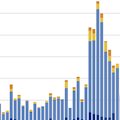Abstract
Traditional approaches to respiratory virus surveillance may not identify novel pathogens in time to implement crucial public health interventions.1 The Seattle Flu Study is a multi-institutional, community-wide pandemic surveillance platform that was established in November 2018.2 Persons reporting symptoms of respiratory illness provided informed consent for testing to identify influenza and other respiratory pathogens (see the Supplementary Appendix, available with the full text of this letter at NEJM.org). In one study group, persons enrolled online and were sent kits, by rapid-delivery services, for home collection of a midnasal swab; samples were returned by mail. After identification of the first case of Covid-19 in Washington State, the samples that were collected were also tested for SARS-CoV-2. After March 4, 2020, a human subjects institutional review board determined that results could be reported to public health authorities and to participants, who were notified under a public health surveillance exemption.
